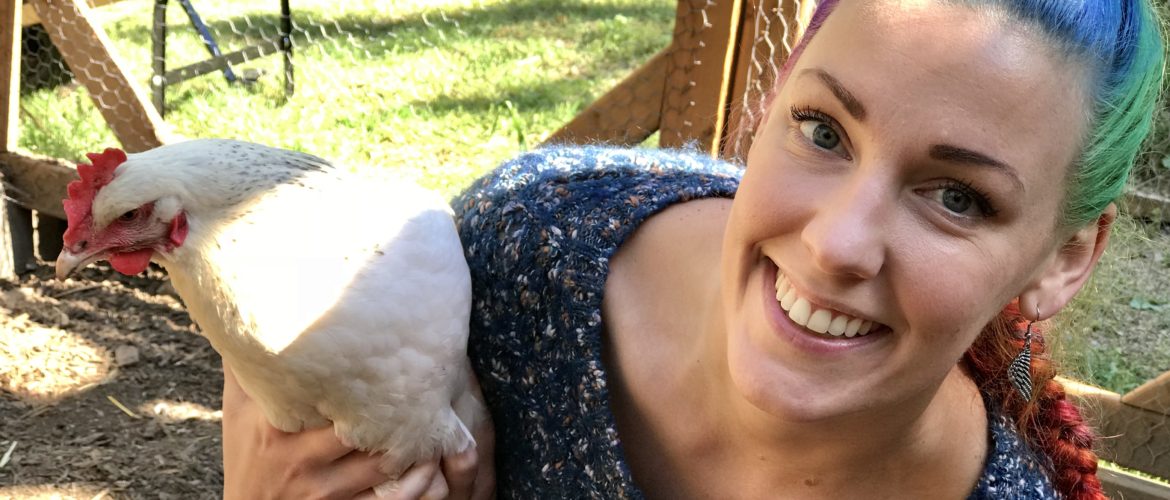“Keeping chickens is easier—or as easy—as you might think.”
Strict vegans who rely on this site for animal-free recipes might not be too keen on this post. And I get it. One aspect of the vegan ethos is that animals are not here for us to exploit. I agree, to an extent.*
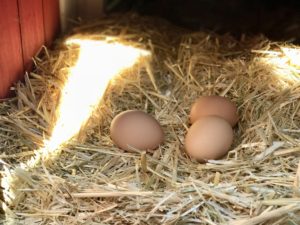
Still warm.
Eggs are a gray area for me. Because hens lay eggs—it’s part of what they do, regardless of whether humans eat them or not. If the egg isn’t fertilized, it doesn’t turn into a chicken. Thus you aren’t taking a life by eating the egg. An egg is essentially raw potential for life, which points to how nourishing they are in one’s diet.
(Aside: I have a vegan friend who calls eggs liquid meat. I had never thought of it that way…)
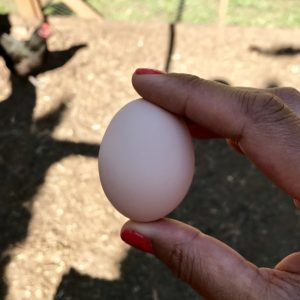
Fact: the color of the egg depends on the breed of the chicken.
Unfortunately, farm fresh eggs are no longer the norm. Efficiencies in farming have led to a commercial industry that is entirely profit-driven, where chick culling and battery cages are common practice. Animal welfare is secondary—at least—to the bottom line. When your eggs are $2/dozen, it’s the chickens that are paying the price.
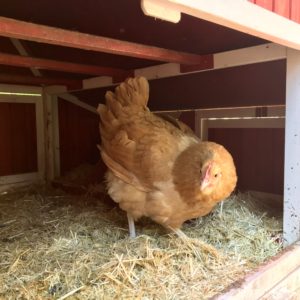
At least 95% of battery hens can only dream of living conditions like this poultry palace.
Learning more about the egg industry led me to an ethical quandary, because eggs are one of my favorite foods, both to cook with and to eat. They are, as I already mentioned, eminently nutritious. They are easy to make and quite possibly the most versatile food on the planet. But once you know how commercial eggs are raised, who wants any part of that?
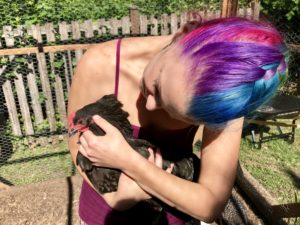
Megan Collier, chicken whisperer.
Enter rainbow city chicken farmer, Megan Collier. When Megan and I became friends and I learned she keeps chickens, I had to take a deep breath to bottle my squeal. I can’t explain it but I my love of farm animals is deep and wide. Little and big, cute and stinky, furry and feathered—I love them all. How soon is too soon to ask someone if you can meet their chickens?
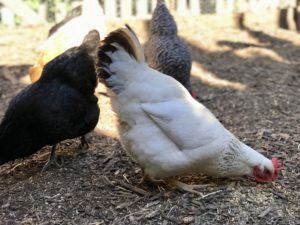
Hens in battery cages are allocated a space smaller than the size of a piece of notebook paper…for their entire lives.
This past spring I asked Megan if she’d be willing to enlighten me—us!—on the whole experience of keeping laying hens. She kindly agreed, and we spent the better part of an hour hanging out with her plucky feathered friends in the backyard of her Seattle-area home.
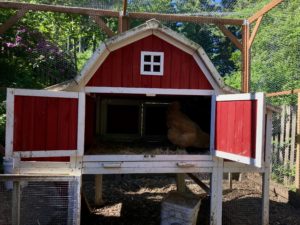
Home sweet chicken home.
Turns out, keeping chickens is much easier than I imagined. Armed with the Internet and a can-do attitude, Megan pretty much figured it all out on her own, from building the chicken run to learning how best to care for her flock. And when the end of life comes for her chickens, well…you can listen to the interview below to learn what she plans to do then.
Needless to say I was quite impressed with her mettle and left the coop feeling inspired at this simple, fun way we can actively participate in the food chain versus letting grocers do it for us.
When do I plan to install a coop of my own? I wish! Unfortunately, keeping our own chickens isn’t possible—or at the very least, wouldn’t be kind—as our 75-pound dog would pester them relentlessly.
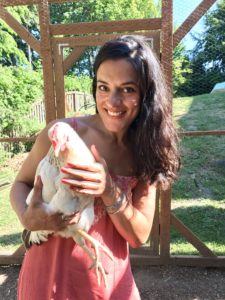
Surprisingly snuggly.
Perhaps you also have extenuating circumstances that prevent you from setting up your own egg farming operation. If that’s the case, you can look for fresh eggs at your local farmers market. Likewise, many co-ops or organic grocery stores sell eggs from chickens raised in more humane conditions (hint: they’re usually the most expensive).
Every one of us can influence positive change through mindfulness—and ACTION—relative to where our food is sourced. From big things like recycling, to small things like ethical eggs: your actions have an impact. Make it good!
Listen to my conversation with Megan and the chickens here:
(*I want to provide resources that are useful and enlightening to everyone, omnivores and herbivores alike. The purpose of this site is to offer insight and perspective about how your diet and lifestyle can best serve you, the animals, and the planet.)
